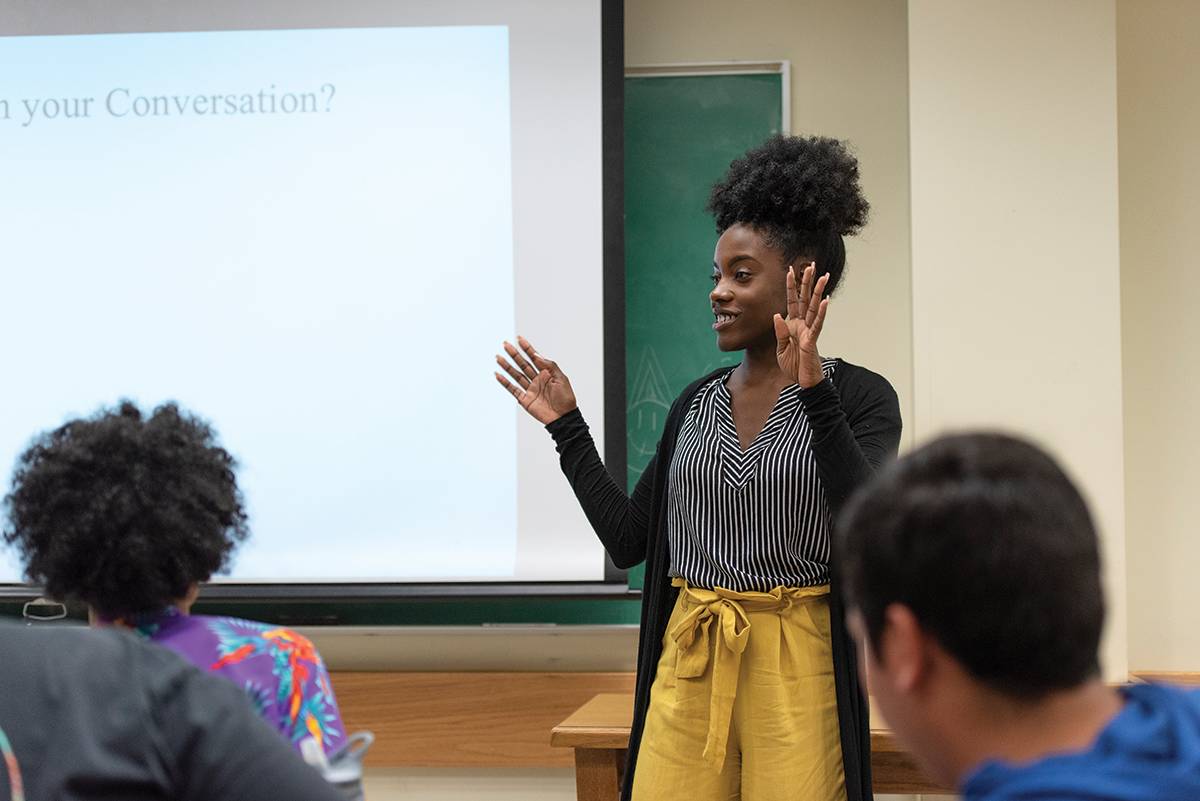Communication Studies (M.A.)
M.A. Communication Studies

Program Overview
The program offers a comprehensive degree incorporating empirical and rhetorical research methods. Students also may customize their programs by concentrating on specialized areas. The program receives consistently high rankings in surveys of master's programs in communication studies. Some alumni pursue doctoral education at the country's top Ph.D. programs.
Course Work
Enrollment in most graduate courses is limited to 18 students. This seminar format allows students to receive individual attention and to explore research programs unique to their own interests. Many classes are offered in the evenings to accommodate working students. Students may pursue a 36-hour master of arts degree culminating in comprehensive exams or a 30-hour degree that includes a thesis. After completion of two required communication research methods courses, students can design their own customized programs from one or more of the following program areas:
• relationship management & well-being
• persuasion, advocacy, & civic engagement
• professional & organizational advancement
| Degree | Concentration | Hours | Thesis Option | Minor Option |
|---|---|---|---|---|
Degree M.A. | Concentration No concentration | Hours 36 | Thesis Option Non-Thesis | Minor Option No minor |
Degree M.A. | Concentration No concentration | Hours 30 | Thesis Option Thesis | Minor Option No minor |
Program Details
Students who are graduate instructional assistants earn financial support during school while taking part in a world-class teacher training program through the department's Teaching & Learning Academy.
Program Mission
Communication studies examines the creation, expression and analysis of messages in the personal, professional, and public spheres. Students learn to manage message processes within and among individuals, groups, organizations, and societies. They explore verbal and nonverbal communication, organizational and business communication, rhetoric and criticism, argumentation and persuasion, and communication technology. Communication studies majors learn principles and practical skills useful for careers in business, industry, government, nonprofit organizations, social services, and education. Graduates enter such professions as law, business, public relations, event planning, public service, teaching, management, human resources, training and development, marketing, sales, public administration, and politics.
Career Options
The program prepares students to meet the needs of industry, the public sector, and academia in the following roles:
|
|
Program Faculty
Faculty members engage in research partnerships with students and community members to embrace and pursue bold, interdisciplinary solutions to common communication challenges. Findings from their work are published in national and international peer-reviewed journals and books, and many of our faculty members are cited as communication research experts in media outlets worldwide. Faculty members have received grants and other extramural funding for their work, and the department is home to recipients of the most prestigious university-level research award at Texas State.
Contact The Graduate College for general questions about getting started with your application, funding your degree, and more. If you have program-specific questions after reviewing the program details, we encourage you to contact the following individuals.
Graduate Advisor
Dr. Lindsay Timmerman
lindsayt@txstate.edu
512.245.1807
Centennial Hall (CENT), Room 323
Advisor Support
Madison Wimmer
m_w183@txstate.edu
512.245.2681
Centennial Hall (CENT), Room 205C

Apply Now Already know that Texas State is right for you?
Application Deadlines
| Deadlines | U.S. Citizen | International |
|---|---|---|
Deadlines Fall - Priority | U.S. Citizen February 1 | International February 1 |
Deadlines Fall - Standard | U.S. Citizen May 15 | International May 15 |
This program's deadline is firm. This type of deadline means the application and other application requirements must be submitted by the program's specified deadline day.
|
|
Funding Information Applications must be complete by the priority deadline to be considered for certain types of funding. |
|
|
Decision Timeline This program reviews applications on a rolling basis. |
Admission Requirements
The items required for admission consideration are listed below. Additional information for applicants with international credentials can be found on our international web pages.
-
Application
- Completed online application
Review important information about the online application.
-
Application Fee
- $55 Nonrefundable application fee, OR
- $90 Nonrefundable application fee for applications with international credentials
Review important information about application fees.
-
Transcripts & GPA
- baccalaureate degree from a regionally accredited university (Non-U.S. degrees must be equivalent to a four-year U.S. Bachelor’s degree. In most cases, three-year degrees are not considered. Visit our International FAQs for more information.)
- a copy of an official transcript from each institution where course credit was granted
- a 3.0 overall GPA or a 3.0 GPA in your last 60 hours of undergraduate course work (plus any completed graduate courses)
Review important information about transcripts. Official transcripts, sent directly from your institution, will be required if admission is granted.
-
Test Scores
GRE
- GRE not required
Approved English Proficiency Exam Scores
Applicants are required to submit an approved English proficiency exam score that meets the minimum program requirements below unless they have earned a bachelor’s degree or higher from a regionally accredited U.S. institution or the equivalent from a country on our exempt countries list.
- official TOEFL iBT scores required with a 78 overall and minimum individual module scores of
- 19 listening
- 19 reading
- 19 speaking
- 18 writing
- official PTE scores required with a 52 overall
- official IELTS (academic) scores required with a 6.5 overall and
- minimum individual module scores of 6.0
- official Duolingo scores required with a 110 overall
- official TOEFL Essentials scores required with an 8.5 overall
This program does not offer admission if the scores above are not met.
Review important information about official test scores.
-
Documents
- resume/CV
- three letters of recommendation from individuals knowledgeable about your academic ability and promise as a scholar
- statement of purpose (approximately 1,000 words) addressing the following:
- Which area(s) of communication studies are you most interested in pursuing and why?
- Describe at least two communication questions you might like to explore, understand better, or develop an expertise in during your graduate study. These questions are not binding; you do not have to research these questions should you be accepted, but they will help us assess your fit with graduate work, our program, and our faculty.
- Why did you select the M.A. in communication studies at Texas State?
- How does your academic background prepare you for graduate study in the Department of Communication Studies at Texas State?
- What are your plans after completing the M.A. degree, and how do you plan to apply your degree?
- Which area(s) of communication studies are you most interested in pursuing and why?
Your statement of purpose will be evaluated on your ability to demonstrate correct composition, grammar, and writing style, to provide a complete and well-developed response, and to explain and justify your answers.
Review important information about documents.